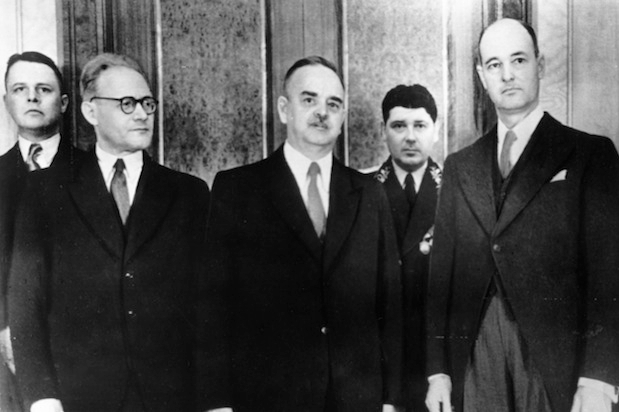George Kennan, the career diplomat and historian best known for his sensible suggestion that the United States try to resist the Soviet Union ‘without recourse to any general military conflict’, is much in vogue these days, at least in Washington, where Senator Rand Paul is presenting Kennan’s theory of ‘containment’ as an alternative to George W. Bush’s disastrous, and disastrously expensive, ‘war on terror’. Now, after two recent biographies and a volume of correspondence, comes a selection of Kennan’s diaries: 684 pages (not including notes) out of some 8,000 extant, covering a span of 87 years — the longest chronological period of any published diary of which I am aware.
The longest, chronologically, and probably the most boring diary I have ever read. Unlike the great diarists — Greville, Nicolson, Lees-Milne — Kennan writes very little about others. His diary is a record of himself, a Domesday book of the acres and perches he has surveyed in his own head: a wide range of ambitions, complaints, masturbatory fantasies, unpublished literary criticism, amateurish verse (‘Beauty is but a rank, eternal lie! / A flower which, only sought, will fade and die’).
Above all it is a collection of cocksure opinions. And what opinions they are! From America (‘an accumulation of millions of individual philistines’) to Zionism (‘nothing to be gained by starting in that direction’) we now know what Kennan thought about nearly everything. The main thing I have taken away from his opinions is that he was very tedious and even more unpleasant. How unpleasant? Here he is writing from Latvia in July 1932, a month before the Nazis won their first general election:
Nothing good can come out of modern civilisation, in the broad sense. We have only a group of more or less inferior races, incapable of coping adequately with the environment which technical progress has created. . . This situation is essentially a biological one. No amount of education and discipline can effectively improve conditions as long as we allow the unfit to breed copiously and to preserve their young. Yet there is no political faction in the world which has any thought of approaching the problem from the biological angle.
The ellipsis comes from the editor, Frank Costigliola, and the mind reels to think what it might omit. Later that year, in December, with Hitler a month and a half away from becoming chancellor, the problem is capitalism, which ‘entails democracy’: ‘I believe in dictatorship, but not the dictatorship of the proletariat. The proletariat, like a well-brought up child, should be seen and not heard.’ It is hard to imagine a better example of what is usually called ‘situational irony’. A pity that Kennan, who served the state department in Berlin from 1929 to 1931, and again from 1939 to 1941, failed to get his hands on a certain best-selling memoir published in the middle of the previous decade: all his worries might have been assuaged.
Though the word ‘eugenics’ does not appear once in John Lewis Gaddis’s Pulitzer Prize-winning authorised biography, this morbid interest in the ethics of reproduction seems to have been with Kennan for most of his life. Here he is at Princeton, aged 20, arguing with a friend called ‘Army’, whose identity Costigliola does not reveal:
He half-converted me to his ‘extermination of the lower races’ idea. I cannot see why it is wrong in principle, although, like most sound theories, it seems impossible when one thinks of the practical difficulties. However, I’m a theorist as long as I’m in college, and as long as possible afterwards. On with free trade & birth control!
Well into his forties he is prattling on about ‘the decline of the race’, and more than half a century later, in May 1987, he’s still at it: ‘Men having spawned more than two children will be compulsively sterilised. Planned parenthood and voluntary sterilisation will be in every way encouraged’ — this under the heading ‘What, if I had my way, would be done in place of what is being done’.
Harold Nicolson thought that diarists ‘should have a remote, but not too remote, audience’ in mind. Who, I wonder, will want to see scorn heaped on ‘the Soviet dissidents, so-called’ and the case made for banning newspaper advertisements? I opened these diaries with a more or less favourable impression of their author, and closed them questioning my beliefs in the many areas in which I agree with him. Is restraint in foreign policy a bad thing? Have most of America’s major cities really become hopelessly ugly? Is Vermont, whose good people produce 5.5 per cent of the world’s maple syrup, ready to become a sovereign republic? One can no longer be sure. If only I had George Kennan’s dull, unflagging confidence.






Comments